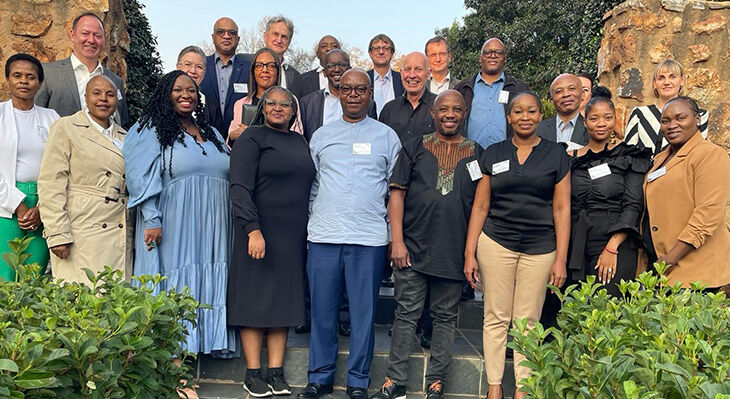Cooperation priority: teaching staff – a key to more attractive vocational education and training in South Africa
27.05.2024
One challenge in vocational education and training is to make vocational teaching staff fit for the future of the training and working world. This topic is at the heart of German-South African vocational education and training cooperation. During a workshop, both countries exchanged possible solutions.

An attractive, prestigious career as a trainer or vocational school teacher: this is the vision for South Africa that Helen Mirren, a long-standing senior employee of the industry authority for technical occupations (merSETA) and now a freelance consultant, would like to promote. This is because the qualification of vocational training personnel remains one of the greatest desiderata for improving the vocational training system in South Africa as a whole.
Accordingly, it is a core element of the extensive German-South African cooperation in vocational education and training. The BMBF and the South African Department of Higher Education (DHET) have agreed on a bilateral group of experts, which is coordinated by GOVET at the Federal Institute for Vocational Education and Training (BIBB). Development cooperation with projects of the Deutsche Gesellschaft für Internationale Zusammenarbeit (GIZ) and the Kreditanstalt für Wiederaufbau (KfW) and German companies working with the German Chambers of Commerce Abroad have also been involved in this area for many years.
Representing the German side in the group of experts are Michael Härtel, Head of the ‘Teaching and Learning, Training Personnel’ Department at BIBB; Prof. Michael Gessler, Chair at the University of Bremen; Prof. Waldemar Bauer, Chair at the University of Erfurt and Dr. Ralf Hermann from GOVET as coordinator. At a workshop near Johannesburg in mid-May, the German experts presented the many initiatives that have also been launched in Germany to strengthen vocational training personnel and to make them fit for the changing world of work and training. The ‘Leando’ portal and the MIKA learning environment – media and IT skills for trainers – both presented by Michael Härtel – were considered in the context of South African solutions such as the National Open Learning System (NOLS). The recent revision of the German regulation on trainer aptitude (AEVO) provided an opportunity to discuss minimum standards, further training and certification for in-company trainers. Not unexpectedly, the difference between the dual system and its high proportion of company-based learning on the one hand and a training system in South Africa that is heavily school-based on the other became apparent. This is also accompanied by a different understanding of the role and different competences that characterise trainers in the two different contexts. Michael Gessler provided a first insight into the ‘Competence Workshop’ and its background: developed over two decades by the University of Bremen and partners, this toolbox is designed to offer trainers complete support through all phases of a training process – from the definition of training objectives to the individual planning and implementation steps and finally to the examination. It also became clear that it is not just about adapting individual elements from this overall process, but above all about aligning the training with an expanded understanding of competence in the sense of independent problem-solving ability. Waldemar Bauer also provided insights into vocational school teacher training in Germany and vocational school teaching practice, in particular the orientation towards the concept of complete competence and practical implementation through learning and work tasks.
The South African partners used the impulses as an opportunity for a lively and technically adept discussion. The group of experts will plan and implement further activities along the lines of their main interests, such as competence standards for trainers or learning and work-based task development. In addition, joint activities in the field of VET research and the interest in the interfaces between technology development and initial and continuing VET were discussed, with a contribution also being made by the South African Department for Science and Innovation as a bilateral partner of the German Federal Ministry of Education and Research (BMBF) in the research cooperation.
At the opening of the workshop, Holger Bodag, head of the Science and Education section at the German Embassy, emphasised the importance of VET cooperation for German-South African cooperation. In the margins of the workshop, talks were held with representatives of the German Embassy in Pretoria and with other strong partners such as the AHK and the GIZ.
At the invitation of the Centre for Research in Education and Labour (REAL) at the University of the Witwatersrand, Michael Gessler and Waldemar Bauer, along with partners from South Africa, Brazil and India, contributed to an international panel discussion entitled ‘Skills for Green Hydrogen: Steering the Path for a Sustainable Future’.
The bilateral expert group on vocational education and training was agreed upon at the South African initiative of the Binational Commission 2020 and deepened in 2023. It is an essential component of the measures for vocational education and training cooperation in the bilateral cooperation of the BMBF with the Department of Higher Education and Training (DHET). The agreed thematic priorities are currently the strengthening of VET personnel and support for the development of work-based training standards, as well as the continuation of transformation-relevant dialogues, e.g. on vocational skills for decarbonisation. GOVET has played a major role in the conceptual development of the expert group together with the DHET, has recruited the German experts for the group and is responsible for the technical and administrative coordination. Members are:
- Michael Härtel, BIBB, Head of Department: Teaching and Learning, Education Personnel
- Prof. Dr. Michael Gessler, University of Bremen, Head of Department, Institute Spokesperson and Chair of the Institute for Technology and Education ‘ITB’
- Prof. Dr. Waldemar Bauer, University of Erfurt, Faculty of Education: Chair of Didactics of Technology and Industrial-Technical Disciplines
Further experts will be involved in an advisory capacity.